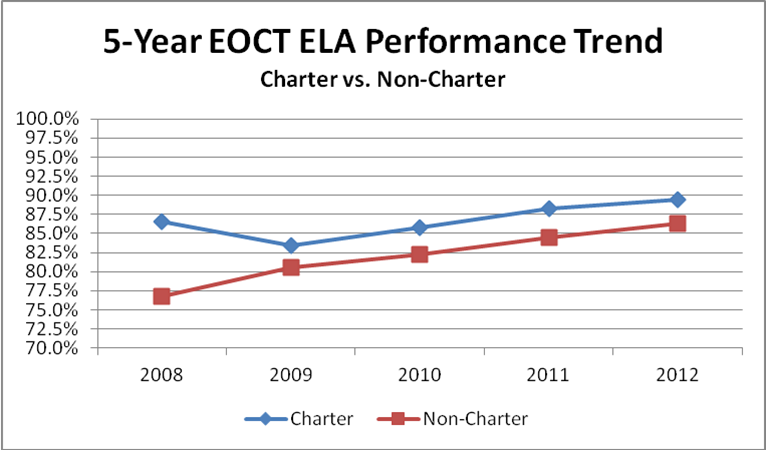State Officials: Charter Schools Ahead on Most Standardized Testing

Georgia Dept. of Education
The Georgia Charter Schools Association recently held a bus tour to visit several charter schools they say are excelling. The tour comes in a year where state officials report that charter schools overall are doing slightly better than traditional ones on most standardized testing.
Third grade teacher Kathleen Jones sits at a small round table with two students as they participate in a reading activity about electricity. Jones is a teacher at the Kindezi School, a K-6 charter school in the Atlanta Public School district. The school was one of four visited on the Georgia Charter Schools Association tour.
Kindezi Principal Dean Leaper says the school focuses on critical thinking, creative expression and emotional growth. He also says the school has smaller class sizes.
“This is thing that makes Kindezi different, I think, is that we have 6-8 students per class.”
Leaper says the school has hundreds on its waiting list and students are seeing success on standardized tests.
“This was the highest performing fifth-grade class in all Atlanta Public Schools last year. We’re very proud of that, in terms of the meeting and exceeding rate.”
Those on the tour also got to visit this coordinate Algebra class at Fulton Leadership Academy in East Point.
“Can I get a volunteer with a hand raised and a mouth shut to read the two equations for number six?”
The school serves sixth through ninth graders and is different than the Kindezi School because it was approved by the State Charter Schools Commission.
The Commission was established after a controversial amendment to the state’s constitution was approved by voters last year.
School principal Gavin Samms says the school is doing better on average than what students in Fulton, DeKalb and Gwinnett counties get on standardized tests.
“Those numbers are extraordinary, so extraordinary for me, I’m sure people thought we were cheating, We were really nervous. I just don’t want to be on the news, so that’s not happening.”
And officials with the state board of education say when you look at the most recent standardized testing data, overall charter schools are slightly ahead of traditional schools. That testing data is from the 2011 and 2012 school year.
Louis Erste is Charter Schools Division Director for the State Board of Education.
“Math is the only one charter schools are behind on and basically they caught up in this past year, so charter schools are at or better than — in five of six categories they’re better than, and in one category they’re equal to.”
Erste explains why he believes that’s happening.
“The whole formula for a charter school is that because you have control over people, time, money, and your building, you’re going to do better, that’s what the research shows. We’re also having a filtering process. The last 3-5 years, schools that aren’t going to make renewal, they’re either not applying or are giving it up altogether.”
But Erste says not every charter school is high performing.
“For every great school you can find that’s a charter, you can find one that’s horrible; for every great traditional school you can find one that’s horrible.”
Meanwhile, the Georgia Association of Educators says it understands that charter schools add value to public education.
But the Association’s director of government affairs, Tracey Ann Nelson, is concerned about the testing comparisons because she believes charter schools are allowed to be more selective than traditional schools.
As an example, she says charter schools require applications and says some schools ask parents to sign a contract for things like volunteer hours.
“I’m not going to say I don’t believe that. If the data says that, the data says that, but you are going to do better if you get to select your students.”
On the state board of education’s website, it says charter school applications should never include screening information. Charter school supporters say schools can ask parents to sign contracts, but they’re not legally binding. Supporters also say federal law prohibits retaliation against students if parents don’t meet the contracts’ requirements.
New standardized testing data comparing traditional and charter schools will be available in December.
9(MDAxODM0MDY4MDEyMTY4NDA3MzI3YjkzMw004))








